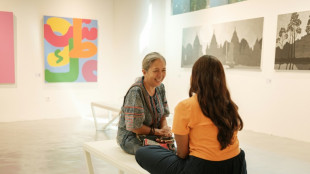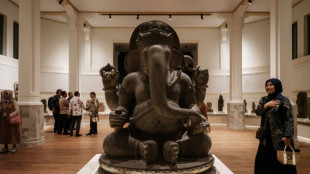
-
 Ski great Vonn finishes 14th on World Cup return
Ski great Vonn finishes 14th on World Cup return
-
Scholz visits site of deadly Christmas market attack

-
 Heavyweight foes Usyk, Fury set for titanic rematch
Heavyweight foes Usyk, Fury set for titanic rematch
-
Drone attack hits Russian city 1,000km from Ukraine frontier

-
 Former England winger Eastham dies aged 88
Former England winger Eastham dies aged 88
-
Yemen rebels strike Israel's Tel Aviv in pre-dawn missile attack

-
 Germany in shock after new deadly Christmas market attack
Germany in shock after new deadly Christmas market attack
-
Pakistan Taliban claim raid killing 16 soldiers

-
 Pakistan military courts convict 25 of pro-Khan unrest
Pakistan military courts convict 25 of pro-Khan unrest
-
16 wounded after Israel hit by missile fired from Yemen

-
 US Congress passes bill to avert shutdown
US Congress passes bill to avert shutdown
-
Sierra Leone student tackles toxic air pollution

-
 German leader to visit site of deadly Christmas market attack
German leader to visit site of deadly Christmas market attack
-
16 injured after Israel hit by Yemen-launched 'projectile'

-
 Google counters bid by US to force sale of Chrome
Google counters bid by US to force sale of Chrome
-
Russia says Kursk strike kills 5 after Moscow claims deadly Kyiv attack

-
 Cavaliers cruise past Bucks, Embiid shines in Sixers win
Cavaliers cruise past Bucks, Embiid shines in Sixers win
-
US President Biden authorizes $571 million in military aid to Taiwan

-
 Arahmaiani: the Indonesian artist with a thousand lives
Arahmaiani: the Indonesian artist with a thousand lives
-
Amazon says US strike caused 'no disruptions'

-
 Indonesians embrace return of plundered treasure from the Dutch
Indonesians embrace return of plundered treasure from the Dutch
-
Qualcomm scores key win in licensing dispute with Arm

-
 Scientists observe 'negative time' in quantum experiments
Scientists observe 'negative time' in quantum experiments
-
US approves first drug treatment for sleep apnea

-
 US drops bounty for Syria's new leader after Damascus meeting
US drops bounty for Syria's new leader after Damascus meeting
-
Saudi man arrested after deadly car attack on German Christmas market

-
 'Torn from my side': horror of German Christmas market attack
'Torn from my side': horror of German Christmas market attack
-
US House passes bill to avert shutdown, Senate vote to follow

-
 Bayern Munich rout Leipzig on sombre night in Germany
Bayern Munich rout Leipzig on sombre night in Germany
-
Tiger in family golf event but has 'long way' before PGA return

-
 Wall Street climbs as markets brace for possible govt shutdown
Wall Street climbs as markets brace for possible govt shutdown
-
Pogba wants to 'turn page' after brother sentenced in extortion case

-
 Court rules against El Salvador in controversial abortion case
Court rules against El Salvador in controversial abortion case
-
Reggaeton star Daddy Yankee, wife resolve business dispute

-
 French court hands down heavy sentences in teacher beheading trial
French court hands down heavy sentences in teacher beheading trial
-
Israel army says troops shot Syrian protester in leg

-
 Tien sets-up all-American NextGen semi-final duel
Tien sets-up all-American NextGen semi-final duel
-
Bulked-up Fury promises 'war' in Usyk rematch

-
 Major reshuffle as Trudeau faces party pressure, Trump taunts
Major reshuffle as Trudeau faces party pressure, Trump taunts
-
Reggaeton star Daddy Yankee in court, says wife embezzled $100 mn

-
 Injured Eze out of Palace's clash with Arsenal
Injured Eze out of Palace's clash with Arsenal
-
Norway's Deila named coach of MLS Atlanta United

-
 In Damascus meeting, US drops reward for arrest of Syria's new leader
In Damascus meeting, US drops reward for arrest of Syria's new leader
-
Inter-American Court rules Colombia drilling violated native rights

-
 Amazon expects no disruptions as US strike goes into 2nd day
Amazon expects no disruptions as US strike goes into 2nd day
-
Man Utd 'more in control' under Amorim says Iraola

-
 Emery insists Guardiola 'still the best' despite Man City slump
Emery insists Guardiola 'still the best' despite Man City slump
-
US confirms billions in chips funds to Samsung, Texas Instruments

-
 English Rugby Football Union chairman quits amid pay row
English Rugby Football Union chairman quits amid pay row
-
Wall Street rebounds despite US inflation ticking higher


Record number of women run for Japan general election
A record number of women are running in Japan's general election this month, although they still account for less than a quarter of candidates, local media said Wednesday.
New Prime Minister Shigeru Ishiba is seeking to shore up his mandate in the October 27 vote by retaining a majority for the long-ruling Liberal Democratic Party.
Japan has never had a woman prime minister and Ishiba narrowly beat one of its few prominent female politicians, nationalist Sanae Takaichi, to the top job in a party leadership vote.
The 1,344 lower house candidates who kicked off their campaigns on Tuesday for all 465 seats include a record 314 women, Japanese media including the Yomiuri and Asahi dailies said.
The ratio of women candidates -- around 23 percent -- is also a record high, according to the Yomiuri.
Ishiba's efforts to encourage women to run -- instead of ex-lawmakers embroiled in a slush fund scandal in certain cases -- is one reason behind the increase, the reports said.
The previous record was 229 in the 2009 general election.
Female leaders are still rare in business and politics in Japan, which is ranked 118 out of 146 in the 2024 World Economic Forum's Global Gender Gap report.
Ishiba's 20-strong cabinet includes just two women.
But the government has set a goal for 35 percent of the candidates for parliament's powerful lower house to be women by 2025, up from 18 percent in 2017.
In Japan, "political parties are male-oriented and not open-minded, so it's difficult to find female candidates," Momoko Nojo, head of the organisation No Youth No Japan, told AFP ahead of September's LDP leadership vote.
"Many women also take on care work at home, which makes it difficult for them to be a politician and take care of their family," added Nojo, who also runs a project to encourage and support women and minorities to become politicians.
A United Nations committee for gender equality is currently reviewing women's rights in Japan.
It is expected to make recommendations to the Japanese government -- for the first time in eight years -- after a meeting in Geneva on Thursday.
C.Meier--BTB
